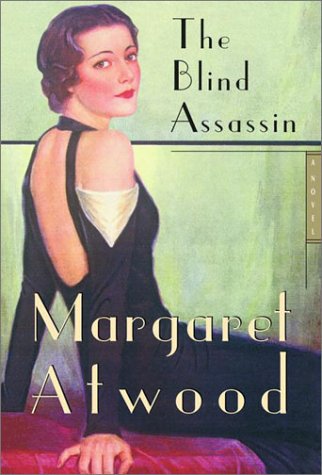Reviewed by brokentune on
The Blind Assassin won the Booker Prize in 2000, but please don't hold it against the book, because, apparently, in 2000 the judges got it right.
I had long been intrigued by this book because of the cover - it looks very stylish - but I had no idea what the book would be about and almost expected this would be another one of Atwood's dystopian speculative fictions.
I was completely wrong. All my preconceptions were totally unwarranted. (Tho, there is a story within the story that is set on a different planet. And there is an alien. Well, in a manner of speaking.)
The Blind Assassin is a family saga set in Ontario and focuses on the lives of Iris and her sister Laura, beginning with one of the most hard-hitting paragraphs I have read recently:
"Ten days after the war ended, my sister Laura drove a car off a bridge. The bridge was being repaired: she went right through the Danger sign. The car fell a hundred feet into the ravine, smashing through the treetops feathery with new leaves, then burst into flames and rolled down into the shallow creek at the bottom. Chunks of the bridge fell on top of it. Nothing much was left of her but charred smithereens."
From there on we get the story of the sisters told in flashbacks through Iris' memory. However, from each memory, we also get this sense that there is much more to the story, that Iris is teasing our patience.
"No: I shouldn’t have married anyone. That would have saved a lot of trouble."
Surprisingly, this slow reveal never gets boring. Atwood weaves in so many layers that each part remains interesting as its own story, but the big picture is only revealed at the end.
In the book, we have the story of a family dynasty, that is being threatened by new money. Then we have class struggle in the early 20th century. We have have a depiction of society and history of the 20th century. We have love. We have cruelty. We have fantasy and stark reality. We have style and ugliness, powerlessness and emancipation. We have submission and we have revenge.
What we don't really have in the book is hate. Having said that, I can't remember the last time I as a reader wanted to punch a character so much as I wanted to punch one in The Blind Assassin. So, even though there is not much hate in the book, there was at least one hateful character, and even though this character's fate is somewhat ambiguous, I am satisfied with my interpretation of it.
This is not the only element of mystery in this book but the one that made it hard for me to put the book down.
I'm sorry it is difficult to describe the plot, and I don't want to give anything away, but it really is not that often that a book fascinates me on so many levels.
And of course, there is Atwood's gorgeous writing.
"The school orchestra struck up with squeaks and flats, and we sang “O Canada!,” the words to which I can never remember because they keep changing them. Nowadays they do some of it in French, which once would have been unheard of. We sat down, having affirmed our collective pride in something we can’t pronounce."
I loved the way Atwood made the characters come to life. Each of them had their own quirks, their own edges - even the supporting characters - which made them feel very real.
On top of that, the main character, Iris, a sassy and cynical old lady, just did not put up with any nonsense. As funny as this sounds, Iris' comments also made me think about some of the issues she raises - even where she claims to dismiss them with snide remarks.
"I knew enough to know that the only thing expected of me was that I not disgrace myself. I could have been back again beside the podium, or at some interminable dinner, sitting next to Richard, keeping my mouth shut. If asked, which was seldom, I used to say that my hobby was gardening. A half-truth at best, though tedious enough to pass muster."
As you can see from the star rating, I absolutely loved this book. In fact, I would now count it as one of my favourites. Atwood has this brilliant ability to tell a gripping story and relate hard issues without being sanctimonious or crass. The book will keep me thinking for some time to come still.
"Some alert functionary caught my arm and slotted me back into my chair. Back into obscurity. Back into the long shadow cast by Laura. Out of harm’s way. But the old wound has split open, the invisible blood pours forth. Soon I’ll be emptied."
Reading updates
- Started reading
- 21 February, 2016: Finished reading
- 21 February, 2016: Reviewed
